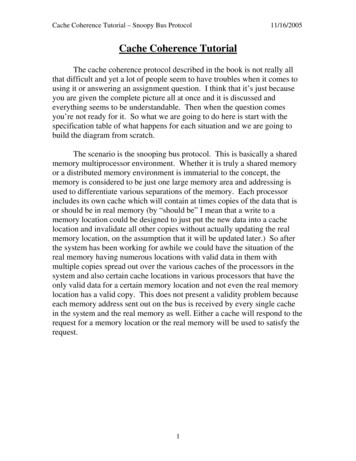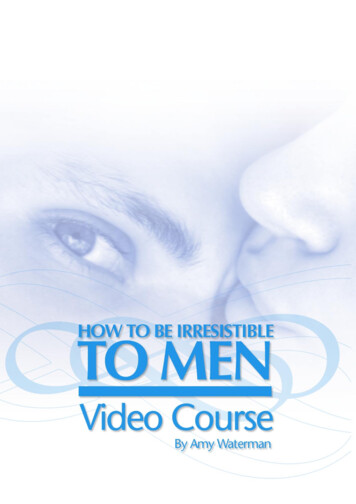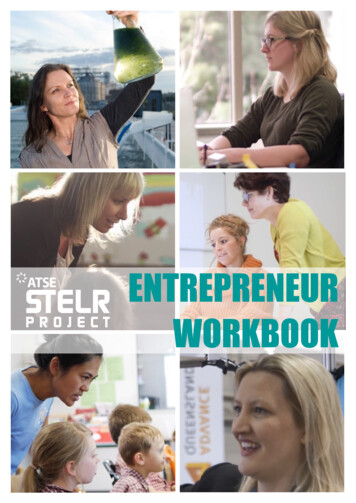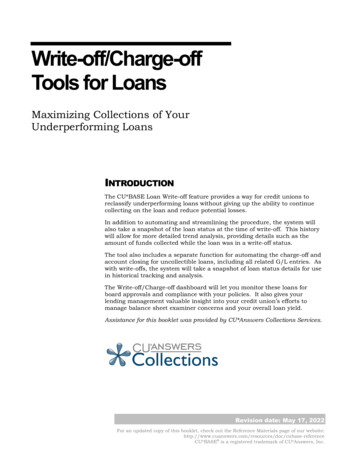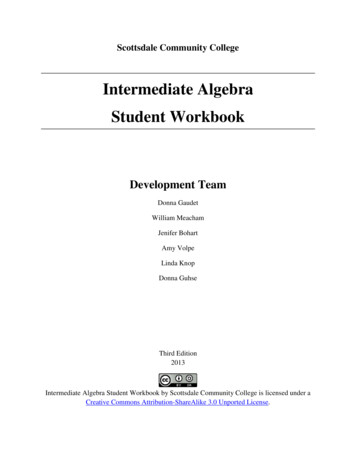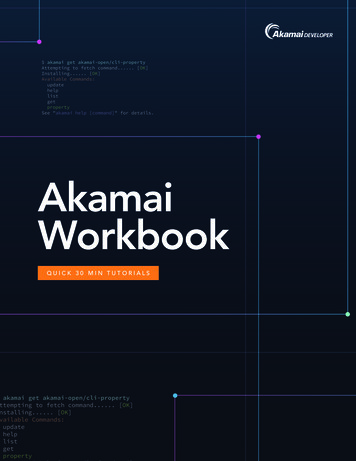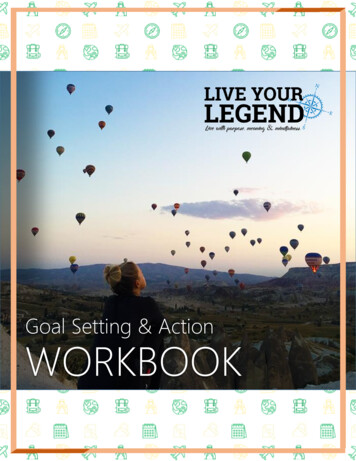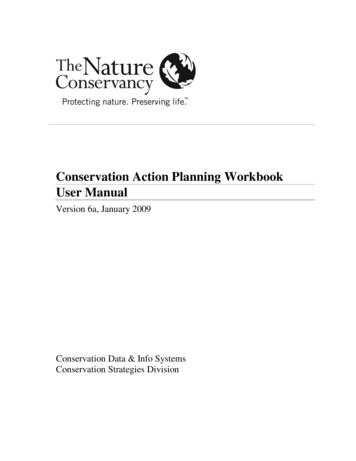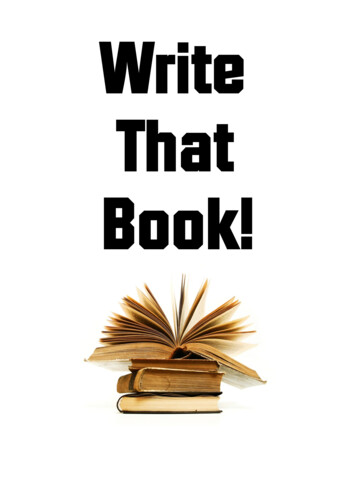
Transcription
WriteThatBook!
Write That Book!There are five main stages to writing and publishing a book:PlanningWritingEditingFormattingPromotingThis workbook will help you crack the first stage - planning - and will give yousome useful advice and tips to guide you through the remaining stages.How to use this bookThe book contains lots of exercises that will help you to find a topic, plan yourcontent and write your book. However, I would suggest that you read it all theway through once before you begin to fill it in.The later chapters include useful information on the writing and publishing processthat’s worth knowing before you begin.Workbook produced by Alison Thompson AKA The Proof Fairy.For help with book coaching, proofreading, formatting & cover design go to:www.theprooffairy.com
So you want to write a book!Writing a book is a fascinating process. Depending on thesubject matter you may find it cathartic, illuminating,frustrating, emotional or exciting - or a mix of emotions!Before you begin writing your book it’s important you thinkabout WHY you want to write it. Writing a book can take manymonths (or even years!) so knowing why you’re doing it andwhat you want to achieve can make all the difference to howmotivated you feel during the writing process.There are many reasons why you might want to write a book,from the prestige of being an author to creating a source ofincome. Here are five big benefits of writing a book.1. Share your storyWe are all unique beings with our own unique stories to tell. Whether it’s an unusualhobby, a challenge you’ve overcome or an imaginary world you inhabit, you have astory worth telling so why not do just that?2. Share your expertiseYou have a huge library of knowledge in your head that deserves sharing with a wideraudience.3. Pass on adviceTake the most important things you’ve learned in life and turn them into a book thatwill help other people.4. Raise your profileSharing your knowledge, expertise and experience, whether achieved through lifeor business, raises your profile. In short, writing a book makes you the expert.5. Open the door to new opportunitiesMedia appearances, invitations to run workshops, speaking gigs, commissions thelist goes on. Don’t dismiss the idea that writing a book will change your life completely!A word of warningDON’T write a book simply to make money! It can be a good source of secondaryincome, but unless you have something equivalent to the Harry Potter series you’reunlikely to make your fortune being a writer! Look on any income as a bonus andfocus on the benefits above – and you will be well on your way to being a successfulauthor!
I want to write a book because There are lots of reasons why people write books - and your reasons might make adifference to the style you choose to write in, the publishing route you choose orthe marketing you do. Tick below all the reasons you want to write a book - or addanything missing from the list.I want to write a book because:I want to share my story, experience or knowledgeI want to make a difference to people’s lives / the wider communityI want to raise the profile of me / my businessI have always dreamt of being an authorI want to share some advice or a message with a wider audienceI want to be famous!I want to leave a lasting reminder of who I wasI want a new careerI want to make moneyI want to win awards and prestigeI want to help other peopleI want to be a best selling writerI want to be a full time author - travelling, writing, visiting book fairs andconferences and signingsI want to have a book published by a famous publishing houseI want to win critical acclaimI want to have a book to give to my friends and familyI want to be able to say “I am an author” or “I have written a book”Other reasons:
What Will You Write About?The key to writing a book is to choose a topic that:Ÿ You are passionate about (or at least have a strong interest in)Ÿ You already know something aboutŸ Other people will be interested inUse the exercises below to find topics that you could write about.Note: If you already have a topic in mind it’s still worth doing the following exercises - you maybe surprised what comes out, and you may discover your second (or third, or fourth) book topic!Topics I am passionate about include:Topics I am knowledgeable about include:Life experiences I’ve had include:
Things I enjoy doing are:Some lessons I’ve learned from life are:People often ask me about / ask me for advice on:I love reading books about and learning more about:
Now look at all your answers and pick out the recurring themes and topics - thethings that you have an interest in, enjoy and are knowledgeable about.Choose ONE of the topics above - the one that appeals to you most - and write downas many broad sub-topics as you can. You might find it useful to do some mindmapping around your topic.My topic is:Sub-topics are:If you’re struggling you might find the following resources useful. Simply type in yourtopic to see suggestions for sub-topics and related topics.Ezine Articles: http://ezinearticles.com/All Top: http://alltop.com/Google’s Keyword Tool: http://bit.ly/hX7WkTYahoo! Answers: http://uk.answers.yahoo.com/
Look for common themes in the ideas you wrote down and group themtogether. Try to come up with twelve general themes . These won’tnecessarily be your chapter headings but they are a good place to start!1.2.3.4.5.6.7.8.9.10.11.12.
Take a sheet of paper for each theme and write down as many ideas as you canwithin that theme.Don’t worry about how weird or wonderful or crazy they might seem - just use thisexercise as a brain dump for all your knowledge on the subject!You should end up with 12 pages covered in topics. Again, you may find mind mappingis a useful tool.Finally, pick out between 3 and 6 ideas for each theme.Using index cards (or separate pieces of paper), write each of the 12 broad themeson a card, and then write each of the sub-topics on separate cards.Use the index cards as your main resource for your book. Expand on each sub-topic,write down vital information, key points to include and details you need to do furtherresearch on.Once you’ve got as much information as you need on the cards, you can use themas your main resource for structuring and writing your book.Sort the themes and sub-topics as much as you want until the structure feels like itwill work.Use the cards as reminders of what you want tocover in each theme area.Keep them with you and add ideas as you think ofthem!You can also use mind mapping for this exercise However, you’ll find it’s much easier to rearrangeindex cards than mind mapping bubbles.
Who Is Your Book For?By now you should have chosen a topic and broken it down into 12 themes, with 3-5ideas for each one. You’ll have written everything down on index cards and sortedthem into an order that makes sense.Next you need to think about who is likely toread your book - who is your ideal reader? Tryanswering the following questions:Who will buy my book?What problems or fears are they dealing with?What will they get from reading my book?What will the outcome be? How would I like their life to improve afterreading my book?
Write a short biography of your ideal reader - gender, age, home,occupation, family, beliefs, likes and dislikes etc - and keep this in mindwhen you write your book.Why are you the ideal person to write this book? Why should peoplelisten to you?Are there any other books you could write that are related to this one?
When and Where to Write Your BookOnce you have discovered your topic, foundyour sub topics and defined your ideal readeryou’re ready to start writing!Every author is different and there are no hardand fast rules to when or where or how youshould write, but here are some tips to helpyou find the time, place and pace that worksfor you.Write regularlyWhile some people can write a little bit here and there, the mostsuccessful authors are those who find a writing “groove” and stickwith it. Your own personal “groove” will depend on your lifestyleand work/family commitments but some of the following mightwork for you:Ÿ Write every day for an hour, first thing in the morning or in the evening.Ÿ Set a word goal - for example, 500 words - and make sure you hit it every day.Ÿ Block out two afternoons a week for writing.Ÿ Write every Saturday (or any other day that suits you).Ÿ Go away for a few days on a “writing retreat” and get the first half of your bookwritten!Find the perfect writing placeSome people can write at their desk; others findthey are too easily distracted by work/Facebooketc. Consider creating a special place that youonly use for writing - perhaps a corner of thedining room or bedroom, or the conservatory and your brain will soon start to associate thatplace with the act of writing.Alternatively many writers find they do their best work in a coffee shop.Try different locations and see what works best for you.
Overcoming Writer’s BlockWriters suffer from writer’s block for many reasons, butoften it’s because:Ÿ You don’t know if anyone will be interested in what youhave to sayŸ You haven’t made a plan and don’t know what to writeŸ You are worried about making spelling mistakesIf you’ve followed the steps in this book you should have a solid plan written by now,so you know exactly what to include in every chapter.Here are some other tips to help you overcome writer’s block.Stick to the writing schedule you have planned. (You have planned one, haven’tyou?) Just write something - anything. Sometimes even writing the lyrics to yourfavourite song or the same line over and over can overcome that fear of the blankpage and get your creativity flowing.Try freewriting. Write continuously for ten minutes - about whatever comes to mind.Again, the act of writing something - even if it’s not related to your book - canovercome the blockage. And you never know what nuggets the freewriting mightreveal - a plan for book number two, perhaps?!Be kind to yourself. So long as you are writing, your book is progressing. Even if youthink it’s rubbish now, you could get a pleasant surprise when you read it back later and there’s plenty of time for editing!If the writing is not flowing, use the time to make notes. You can fill in the gapsanother day.Don’t worry about grammar or spelling. That can all be fixed later on! Just takepen to paper (or fingers to keyboard), relax and let the words flow. The best booksare written when the writers are in full flow and not worrying about the detail!Set a deadline. Sometimes setting a deadline of when you want to finish - or evenpublish - the book can help the writing process. If you’re really brave, set a realisticdate for a book launch - virtual or physical - organise an event and invite your friends.There’s nothing quite like the idea of letting people down to motivate you!
So You’ve Finished Writing Congratulations! Now What?Congratulations, you’ve completed the first two stages of publishing a book - planningand writing!Here is an outline of the remaining three stages.EditingEditing is the process of taking your raw material and turning it into a book thatpeople will want to read. The editing process can be as long as you want - butbeware getting stuck in an “editing cycle”. In some ways your book will neverquite be perfect so go for “as good as it gets”!The editing process looks something like this:First edit - Do this a couple of weeks after you start writing, so you come to itwith fresh eyes. Read through and look for issues with continuity (Does a maincharacter’s name change from Tracey to Stacey partway through?) and clarity(Will someone with no knowledge of the topic understand what you mean?). Lookfor sections you want to expand, delete or rewrite.Second edit - Read through again, looking for clunky phrasing, spelling mistakesand grammatical errors.Send to “beta readers” - Beta readers are people who have volunteered to readan early draft of your book and give you feedback. Choose people who are likelyto be your target readers. Warn them there may be typos and ask them tocomment on content - what they want more of, what they want less of and whatmakes no sense!Respond to feedback - This could mean a few tweaks here and there or acomplete rewrite! Of course you can disregard everything the beta readers say but remember, they are your target market!Read again - By now you should have a manuscript that you are happy with. Readit through one more time to spot any errors that have crept in during the editingprocess.Send to a proofreader - This stage is vital. No matter how good you are atspotting errors, it is actually impossible to proofread your own work so do invest inthe services of a professional proofreader to ensure your book is published withoutany typos.
FormattingFormatting is quite simply getting your book into the right format for publication,whether in print or digitally. How you format your book depends a lot on how youplan to publish.Traditional PublisherIf you have been lucky enough to land a contract with a publisher then they arelikely to manage the formatting process for you.Short Run Printing/Print on DemandEvery printer will have their own requirements for your manuscript so check withthem how they want it formatted. Print books can usually be formatted in wordprocessing programmes and supplied as raw text or a PDF. However, you need toknow page size and trim size and be aware of things like page numbering. You alsoneed to choose suitable fonts for your printed book - Comic Sans is rarely likely tomake a good impression!Kindle ebookIf you are publishing your ebook with Kindle then there are very specific rules onhow the document needs to be formatted. The free Kindle book “Building Your Bookfor Kindle”, available from Amazon, is well worth reading and referring to.Smashwords ebook (for Nook, iBooks, Sony etc)Smashwords has even more restrictive rules on formatting and it’s a completelydifferent format to that of a Kindle book. Again there is a free ebook available fromAmazon or Smashwords, “Smashwords Style Book”, which will help you here.Cover DesignProofreading is one vital expenditure; cover design is another. It’s easy to spot DIYcovers so unless you are a graphic designer don’t try to do it yourself!Book covers are available to suit every budget, from pre-made designs with yourcover added to customised covers that cost from very little to a huge amount! Workout what your budget is and then see what’s available for the price.Also bear in mind that digital books only require front cover artwork, whereas printbooks need the back cover and spine too.Spot the professionally-designed cover!
Promoting Your BookSo you’ve planned your book, written the content, edited and formatted it and youhave a killer cover. You’re ready to upload it to your printer/digital ebook distributorand wait for the money to roll in, yes?Not quite because your book will be lost amongst the millions of other books outthere if you don’t promote it. Marketing deserves a whole book to itself but hereare just a few ideas to get you started.We’ve now reached the end of this workbook. I hope you found it both interestingand useful, and you’re now all ready to get started and write that book!However, writing a book isn’t easy and there may be areas that you would like somehelp with. On the next few pages you’ll find a checklist to help you navigate yourway through the writing and publishing process. I’ll also explain a little about howI help authors realise their dream of writing and publishing a book.
Write That Book! ChecklistThere’s a lot involved in writing a book - probably a lot more than you anticipateright now. Use this checklist to help you through the process. Identify your motivation for writing a bookIdentify a topic and subtopicsDefine who your ideal reader isResearch what other books are out there on the same topicFind a writing coach, mentor or writing buddy to support youPlan your contentSet a writing scheduleWrite that book!Choose a title (and subtitle)Check no one else has used that title!Decide whether to use your own name or a pen nameCheck whether there are other authors using that name
Do a first editChoose some beta readersSend the first edit to beta readersMake changes based on feedbackWrite acknowledgements, disclaimer, dedication, etc.Write an author bioWrite back cover sales copyFind a copyright noticeFind any quotes or images you want to useDo a final editSend the book to a reputable proofreaderResearch publishing options - traditional, short run, POD, digitalChoose your ideal publishing routeSend finished book to relevant people/organisations for reviews
Format book for your chosen publishing routeArrange cover designUpload/send book to printer/publisherBuy ISBN number, if requiredCreate an author platform using social media, a website etcWrite press releaseSend press release to relevant local/national media and organisationsPromote, promote, promote!Order copy of bookHold book in hand (or on Kindle) and let the celebrations begin!This checklist is not exhaustive but it will give you an idea of everything that’sinvolved. Depending on the publishing route you take not all steps will be necessary- for example, if you get a traditional publishing contract the publisher is likely todo a lot of the work for you. If you self-publish you will be responsible for everyelement - though of course there are plenty of people out there who are able tohelp you.Please don’t be put off by the list!Writing a book is an amazing experience and a massive achievement and help isat hand.Whether you want someone to help you find a topic, set goals and get the bookwritten or you need more practical help with proofreading, formatting andmarketing, I am on the end of the phone just call me on 01367 888229 oremail me at alison@theprooffairy.com for a no-obligation chat!
The Proof Fairy’s Services for AuthorsI offer the following services for authors - visit www.theprooffairy.com, email meat alison@theprooffairy.com or call me on 01367 888229 for further information.Book CoachingIf you need someone to help you with the planning and writing stage of your projectthen I can help. As a book coach, I help people find a topic, set goals and overcomeobstacles so they can turn their dreams of being a published author into reality.I offer two coaching packages:Ad Hoc CoachingPick up the phone and talk whenever you want. Calls via phone or Skype are 60per half hour.Book Coaching PackageUnlimited telephone or Skype coaching so you can work on your idea, structure andcontent, overcome writer’s block, discuss the best publication route for you andmore. Plus unlimited email support and access to a Facebook group where you canmeet other writers.More details about the coaching programmes, including prices, can be found on mywebsite: freading Formatting - for Print and Kindle Cover DesignFor details on all the above services please visit www.theprooffairy.com/servicesfor-authorsYou can also email me at alison@theprooffairy.com or call me on 01367 888229for more information or a quote.
Everyone has a book in them what’s your story?www.theprooffairy.com
There are five main stages to writing and publishing a book: Planning Writing Editing Formatting Promoting This workbook will help you crack the first stage - planning - and will give you some useful advice and tips to gui


